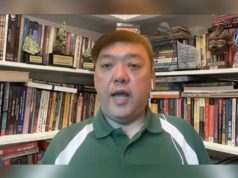Malacañang’s interpretation of freedom of speech on two newsmakers was compared online.
The Palace’s earlier stance on exercise of freedom of speech on the song released by the Chinese Embassy and the case of an overseas Filipina worker in Taiwan who criticized President Rodrigo Duterte were notably different.
Taiwan’s Ministry of Foreign Affairs (MOFA) on Monday “rejected” the Philippines’ request to deport Filipina caregiver Elanel Egot Ordidor, also known as Linn Silawan on Facebook, over “nasty and malevolent” posts against Duterte on the social networking site.
MOFA added that Ordidor has the right to freedom of speech, as protected by Taiwan’s Constitution.
“Taiwan is a sovereign, independent country where foreign workers enjoy ‘citizen treatment,’ and their rights and interests are protected by relevant laws and regulations, including freedom of speech, which should be respected by governments of all countries,” Taiwan News reported.
The report, quoting the statement of Taiwan’s foreign ministry, added that “no person or institution, in this case, has the right to pressure her, her employer, or broker, nor shall she be deported without consultations held between both governments.”
The media outlet said that Ordidor previously posted a video on her social media account where she “complained about the harsh measures imposed by Duterte’s government during its lockdown” to contain COVID-19 in the archipelago.
She also reportedly questioned whether Duterte “had thought through the consequences of the government interventions” and “complained about families being unable to receive remittances.”
Ordidor also remarked that Filipinos should not be “too loyal” to Duterte.
The Department of Labor and Employment earlier said that it will have Ordidor deported from Taiwan for supposedly committing cyber libel under the Cybercrime Prevention Act of 2012.
Reports said that Ordidor was also asked to delete her controversial video and issue a public apology to Duterte for her remarks.
Media groups have long called for the decriminalization of libel as its provisions were thought to be “problematic for free expression and press freedom since 1932.”
The Palace, however, denied that the Philippine government sought the deportation of Ordidor but added that it is ready to assist her should she be deported.
“Wala pong katunayan na tayo mismo ang naghingi ng deportation na ‘yan kasi hindi naman po natin pinakikialaman ‘yung mga milyon milyong OFWs at lahat ng kanilang sinasabi dahil dito po sa ating bayan, ay meron naman tayong karapatan ng malayang pananalita,” presidential spokesperson Harry Roque said.
Roque added that the Palace will let the authorities of Taiwan decide on Ordidor’s situation.
Taiwan recognizes and protects an individual’s freedom of speech, as stated on its 1947 Constitution amended in 2005. Article 11 specifically states:
“The people shall have freedom of speech, teaching, writing, and publication.”
The Chinese ‘propaganda’ video
DOLE’s reaction over Ordidor’s posts on Facebook prompted some Filipinos to recall how the Palace had reacted when a tribute music video released by the Chinese Embassy earned backlash for supposedly showing “propaganda.”
“Bakit ang Tsina may freedom of speech, pero si Linn Silawan wala?” a Facebook user said as he juxtaposed news reports about the incidents.

Former presidential spokesperson Edwin Lacierda also retweeted a quote card of Roque reacting to the backlash against the “Iisang Dagat” music video.
“So why is DOLE threatening to deport an OFW who was exercising free speech? You defend propaganda selling out our country and so sensitive when it comes to criticism. Not even a whiff of disagreement as to its content,” Lacierda said on Twitter.
Another Twitter user quoted a news report about the Palace’s stance on the video and compared it with the OFW’s case.
“‘Malacanang says ‘Iisang Dagat’ video covered by free speech.’ THIS IS A BIG WTF??? What about the OFW you want deported from Taiwan for practicing her right to free speech?” he wrote.
Last Thursday, the Chinese Embassy with the participation of Camarines Sur vice-governor Imelda Papin, Chinese diplomat Xia Wenxin, Filipino-Chinese singer Jhonvid Bangayan and Chinese actor Yubin, released a tribute to health workers and other frontliners in the novel coronavirus pandemic.
Titled “Iisang Dagat (One Sea),” the song was supposed to highlight the partnership and mutual support between China and the Philippines in dealing with the virus.
RELATED: A propaganda?: Chinese embassy’s ‘Iisang Dagat’ music video gets dislikes and take down requests
However, several Filipinos called for the video’s take down since it appeared to be an “insult” to Filipino fisherfolks who have since been harassed by Chinese vessels in the West Philippine Sea.
A Twitter user called it “a Chinese propaganda about their ownership of the West Philippine Sea masked as a song of unity about COVID-19.”
A Twitter account advocating for marine life also shared screenshots of previous reports showing alleged harassment and poaching of important resources in the West Philippine Sea as perpetuated by Chinese fishermen.
“China is a traitor and will never be our friend. No friend steals from you while you are still battling a pandemic,” it said.
The Chinese Embassy's "Iisang Dagat" song is nothing but an insult to the Filipino people especially the fisherfolk. China is a traitor and will never be our friend. No friend steals from you while you are still battling a pandemic. #StandWithFisherfolk #AtinAngPinas #ChinaLayas pic.twitter.com/izgm5qEM7t
— Mangingisda #OustDuterte (@MangingisdaSays) April 25, 2020
The Palace, in response to the criticisms, invoked free speech as supported in the 1987 Philippine Constitution in defending the music video.
“Sa ating Saligang Batas naman, lahat tayo mayroong karapatan ng malayang pananalita. Ang isang video na kasama ‘yung mga awitin, kabahagi ‘yan ng karapatan ng malayang pananalita,” Roque said.
“Ang sabi ng ating Korte Suprema, lahat ng karapatan sa ating bill of rights ay binibigay din natin sa mga dayuhan na naninirahan sa ating bayan,” he added.
Section 4 of the Bill of Rights of the Constitution states the following about the freedom of speech:
“No law shall be passed abridging the freedom of speech, of expression, or of the press, or the right of the people peaceably to assemble and petition the government for redress of grievances.”
Since Duterte took office in 2016, the country has shifted its foreign policy to China despite the continuous encroachment of the latter in Philippine maritime territories.










